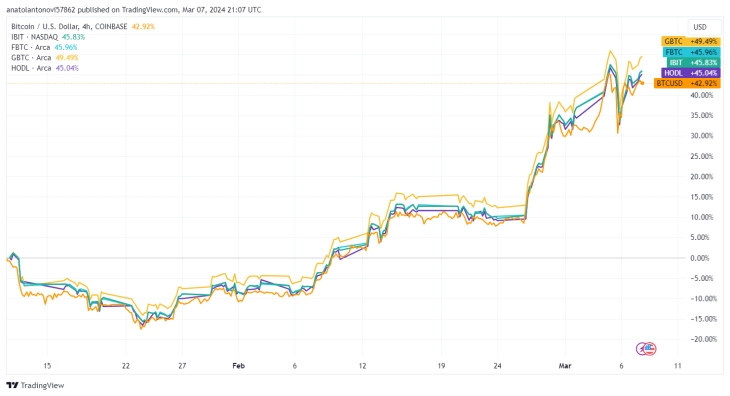
Key takeaways:
- The price of bitcoin and bitcoin ETFs are nearly identical.
- ETFs are more suitable for investors who want to manage their bitcoin and other investments from a traditional brokerage account, such as stocks and bonds.
- Buying and holding bitcoin directly is more suitable for crypto-confident investors who are comfortable setting up and managing their crypto account or wallet. It also opens up the potential to participate in DeFi opportunities.
Now that spot bitcoin ETFs have been approved by the SEC, it’s easier than ever for crypto investors to buy and hold bitcoin in their portfolios. (See our guide to Investing in Bitcoin ETFs.)
However, savvy investors still wonder: Is it worth investing in bitcoin ETFs instead of actual bitcoin?
This article explores the main differences between the two options, to help you decide which may be best for your portfolio.
Bitcoin ETFs vs. Holding Bitcoin Directly
While bitcoin ETFs are linked to the price of bitcoin by market cap, they differ significantly from their core asset.
Let’s explore how they differ based on several factors:
Accessibility
Both bitcoin and bitcoin ETFs are easily accessible to institutional and retail investors.
- Bitcoin is listed on hundreds of cryptocurrency exchanges, including popular platforms like Coinbase and Binance. Investors can buy cryptocurrency by paying with fiat or exchanging digital currencies. In this case, they own bitcoin and can move it to a secure digital wallet to access the private keys.
- Bitcoin ETFs have higher liquidity and are more accessible to traditional investors. They can purchase them through traditional brokers like Schwab and Etrade, and they can easily buy ETF shares through these brokerages by paying with fiat.
Availability
While bitcoin is available 24/7, ETF shares can be traded only during market hours, which are business days from 9.30 AM to 4.00 PM ET. This can mean that those investors who want direct access might find ETFs too traditional.
Risk
Investing in bitcoin through a reputable crypto exchange or buying ETF shares through a broker are safe approaches. However, the former involves slightly more risks, especially for non-tech-savvy investors.
Holding crypto assets in a hot wallet can be riskier due to potential hacking attacks or even bankruptcy of an exchange, which happened to FTX. The safest way is to move funds to a secure hardware wallet, but losing it or losing access to the private key means the crypto funds are gone forever.
Investing in ETFs is generally safe, as the funds are regulated, but shareholders must trust the issuing company.
Returns
Since ETFs hold bitcoin in custody, they have similar returns over time. Still, ETFs can sometimes become more volatile. As of this writing, they have outperformed BTC.

Also, short-term traders must consider that ETFs aren’t available for trading after market hours.
Fees
Trading bitcoin ETF shares can be a bit more expensive. Most bitcoin ETFs, including those provided by BlackRock, VanEck, and Fidelity, charge a 0.25% fee per trade. Grayscale’s ETF, which accounts for over 60% of total bitcoin ETF holdings, charges a 1.5% fee.
Trading fees on crypto exchanges are much lower. On Coinbase, for example, fees range from 0.05% to 0.6%.
Regulation
The SEC fully regulates Bitcoin ETFs, ensuring the total bitcoin reserves are in custody.
Bitcoin itself is hosted by a global decentralized network with no authority governing it, and the regulation of crypto platforms is still limited in the US.
Notably, bitcoin is treated as a commodity in the US, while the ETF shares represent securities.
Considerations for Investors
Bitcoin ETFs and physical bitcoin react to the same market conditions. Also, since their price quotations move almost in tandem, they are almost perfectly positively correlated, giving them the same risk profiles.
However, regarding investment goals, the two options can meet different needs.
Specifically, ETFs are easier for investors who want to diversify a traditional portfolio that also allocates to stocks and bonds (the strategy we follow in our Blockchain Believer’s Portfolio). You can hold all your stocks, bonds, and bitcoin in one account.
With holding bitcoin directly, you’ll need to open a separate account or wallet to hold your bitcoin and your brokerage account. It’s a little more complicated, but it gives you control over your BTC.

What are Bitcoin ETFs?
Bitcoin spot ETFs are investment funds offering investors direct exposure to bitcoin.
ETFs are listed on traditional stock markets, such as the Nasdaq and the New York Stock Exchange (NYSE), and are regulated by the SEC.
These ETFs must hold actual bitcoin with a custodian, enabling them to follow the bitcoin price closely.
What is Bitcoin (BTC)?
Bitcoin is a digital asset that resides on blockchain, which is run by a decentralized network of nodes distributed worldwide.
It is the first use case of blockchain and has always been the largest cryptocurrency by market cap, with a $1.3 trillion valuation as of this writing.
Bitcoin was launched by an anonymous entity that envisioned it as a decentralized peer-to-peer money system. However, it has become a store of value (SOV), giving investors an alternative way to store wealth and hedge against inflation.
Investor Takeaway
To conclude, bitcoin ETFs are easier for traditional investors who want exposure to bitcoin within their standard brokerage accounts. They can allocate to bitcoin ETFs to diversify their traditional stocks and bonds portfolios.
Investing directly in bitcoin is better for crypto enthusiasts who understand the intricacies of blockchain transactions, digital wallets, and crypto products. Bitcoin holders can also participate in decentralized finance (DeFi) by converting to Wrapped Bitcoin (WBTC), which opens up several yield-bearing opportunities.
FAQs
What is the difference between bitcoin and bitcoin ETFs?
Bitcoin is a cryptocurrency that resides on a decentralized blockchain network. A bitcoin ETF is an investment fund that gives exposure to bitcoin by holding the crypto in custody and issuing shares on the stock exchange.
How do I invest in Bitcoin Spot ETFs?
You can buy bitcoin spot ETF shares like any other stock, which can be done through a brokerage account, i.e., Fidelity, TD Ameritrade, or Robinhood.
Do bitcoin ETFs own bitcoin?
Yes, bitcoin spot ETFs are required to hold an equivalent amount of crypto in custody and are fully regulated by the SEC, so you should feel comfortable that they are trustworthy and safe.
Subscribe to Bitcoin Market Journal for the latest updates on bitcoin ETFs and other blockchain investment opportunities!

